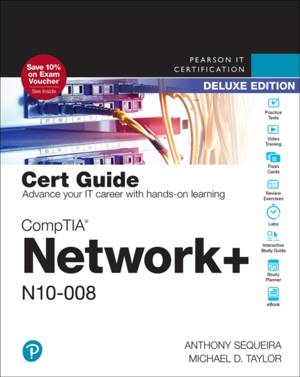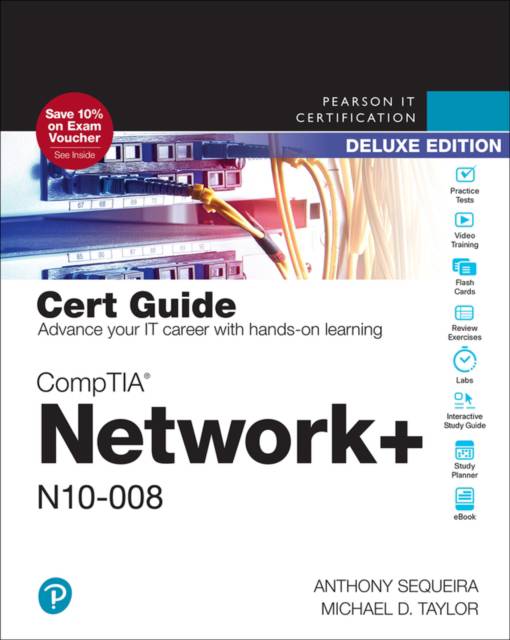
- Retrait gratuit dans votre magasin Club
- 7.000.000 titres dans notre catalogue
- Payer en toute sécurité
- Toujours un magasin près de chez vous
- Retrait gratuit dans votre magasin Club
- 7.000.000 titres dans notre catalogue
- Payer en toute sécurité
- Toujours un magasin près de chez vous
Description
Trust the best-selling Cert Guide series from Pearson IT Certification to help you learn, prepare, and practice for exam success. They are built with the objective of providing assessment, review, and practice to help ensure you are fully prepared for your certification exam.
CompTIA Network+ N10-008 Cert Guide, Deluxe Edition presents you with an organized test preparation routine using proven series elements and techniques. Key Topics call out critical concepts. Exam topic lists make referencing easy. Chapter-ending Exam Preparation Tasks and Review Questions help you drill on key concepts you must know thoroughly.
- Master CompTIA Network+ N10-008 exam topics
- Assess your knowledge with chapter-ending quizzes
- Review key concepts with exam preparation tasks
- Practice with realistic exam questions in the practice test software
CompTIA Network+ N10-008 Cert Guide, Deluxe Edition contains proven study features that allow you to succeed on the exam the first time. Expert instructor Anthony Sequeira shares preparation hints and test-taking tips, helping you identify areas of weakness and improve both your conceptual knowledge and hands-on skills, essential for successful completion of the performance-based testing items on the exam. This complete, CompTIA-approved study package includes the following:
- A test-preparation routine proven to help you pass the exams
- Clearly defined chapter learning objectives covering all N10-008 exam topics
- Chapter-ending review questions and exam preparation exercises, which help you drill on key concepts you must know thoroughly
- The powerful Pearson Test Prep practice test software, complete with hundreds of well-reviewed, exam-realistic questions, customization options, and detailed performance reports
- 40 performance-based exercises to help you prepare for the hands-on exam questions
- More than 60 minutes of video mentoring
- A final preparation chapter that guides you through tools and resources to help you craft your review and test taking strategies
- An Exam Essentials appendix that quickly recaps all major chapter topics for easy reference, both in print and interactive digital format
- A key terms Glossary in both print and on the companion website, which acts as an interactive flash-card application
- Study plan suggestions and templates to help you organize and optimize your study time
- A 10% exam discount voucher (a $33+ value!)
This Deluxe Edition also includes two special features:
A free copy of the CompTIA Network+ N10-008 Cert Guide Premium Edition eBook and Practice Test. This package provides you access to three eBook files (PDF, EPUB, and Mobi/Kindle format), more than 400 exam-realistic practice test questions, and links from all the questions to the specific sections in the PDF eBook file for detailed explanations and review.
A free copy of the CompTIA Network+ N10-008 Hands-on Lab Simulator, including more than 75 hands-on practice labs covering real-world network configuration scenarios in Windows GUI and Cisco router and switch CLI environments, hardware activities, network design exercises, and technology mapping tasks.
Master the topics on the CompTIA Network+ N10-008 exam, including:
- Network topologies and media types
- IP addressing
- Network services
- Data center architectures and cloud concepts
- Routing, Ethernet switching, and wireless networking
- Network availability and disaster recovery
- Network security
- Remote access
- Network troubleshooting
In addition to the wealth of content and exam preparation exercises, this edition includes a series of free hands-on exercises to help you master several real-world configuration and troubleshooting activities. These exercises can be performed on the CompTIA Network+ N10-008 Hands-on Lab Simulator software, included free on the companion website that accompanies this book. This software, which simulates the experience of configuring real operating systems and network devices, contains the following 75+ free lab exercises:
1. OSI Model Layer and Network Devices
2. OSI Model Layer Functions
3. Network Topologies
4. Network Cabling
5. Identify Common Cat5 Wiring Problems
6. Create a Straight Cable and Test It
7. Create a Crossover Cable
8. Create a Console Cable
9. IPv4 Address Types and Classes
10. IPv6 Addressing Terminology
11. Truncating IPv6 Addresses
12. Intermediate IPv4 Addressing Practice
13. IPv6 Address Placement
14. Configuring a Client Network Adapter with an IPv4 Address
15. Configuring a Network Adapter with an IPv6 Address
16. IPv6 Router Gateway Addressing
17. Matching Well known port numbers
18. TCP/IP Protocols and Their Functions
19. DHCP Technology
20. Network Application Protocols
21. Application Layer Network Server Descriptions
22. Internet of Things
23. Details of DHCP Client Address Configuration Process
24. Contrast Virtualization Technologies and Services
25. Using Cloud Storage
26. Workstation Virtualization
27. Connecting to the Router's Console Port
28. Configuring an Ethernet Interface on a Router
29. Connecting Two Routers to Each Other
30. Verifying a Router-to-Router Connection with Cisco Discovery Protocol
31. Static and Default Routing
32. Configuring Dynamic Routing
33. Reading a Routing Table
34. Using ARP to Discover the MAC Address
35. Troubleshooting VLAN Client Connection Issues
36. Configuring Static Hostname Resolution on a Workstation
37. Connect to Switch Console Port Using PuTTY
38. Connect to a Switch and Reconfigure the Hostname and Password
39. Configure an IP Address and Default Gateway setting on a Switch
40. Switch Management via Telnet
41. Configuring Port Security
42. Wireless Security Terminology
43. Switching Terminology
44. Wireless Antenna Placement
45. Manually Configuring Wireless Signals on a Small Office/Home Office Router
46. Identifying Network Performance Terminology
47. Disaster Recovery/Business Continuity
48. Network Vulnerabilities
49. Secure Protocols vs Unsecure Protocols
50. Types of Network Threats and Attacks
51. Security Terminology and Descriptions
52. Cryptographic Authentication Terminology
53. Creating Network Users on a Domain Controller
54. Network Security Appliance Terminology and Methods
55. Configuring a Small Office/Home Office Router - Network User Security Settings
56. Configuring a Small Office/Residential Router - Network User Security Settings
57. Folder Sharing and Security
58. Using Encrypting File System (EFS) to Encrypt Data Files
59. WAN Terminology
60. Configuring a VPN Client
61. Troubleshooting Practice
62. Identifying Troubleshooting Commands to use for various tasks
63. Matching Command Output to Commands
64. Verify a Data Link Connection from a Computer to a Network
65. Using Ipconfig to Discover Network Settings
66. Using ping to Troubleshoot Connectivity
67. Using Extended Ping (Command Switches) to Troubleshoot Connectivity
68. Using ipconfig, ping, arp, and tracert, to Troubleshoot Connectivity
69. Using basic Linux troubleshooting commands
70. IPv6 Troubleshooting
71. Matching Wireless Standards and Terminology
72. Reordering Troubleshooting Steps
73. Using NSLookup for DNS Troubleshooting
74. DNS Troubleshooting Simulation
75. Exploring Troubleshooting using PowerShell
76. Using tracert to Troubleshoot Connectivity
77. Using the route print Command
78. Using netstat to Troubleshoot Connectivity
CompTIA Network+ N10-008 Hands-on Lab Simulator Minimum System Requirements:
Windows: Microsoft Windows 10, Windows 8.1; Intel Pentium III or faster; 512 MB RAM (1GB recommended); 1.5 GB hard disk space; 32-bit color depth at 1024x768 resolution
Mac: Apple macOS 12, 11, and 10.15; Intel Core Duo 1.83 Ghz or faster; 512 MB RAM (1 GB recommended); 1.5 GB hard disk space; 32-bit color depth at 1024x768 resolution
Other applications installed during installation: Adobe AIR 3.8; Captive JRE 6
Companion Website:
The companion website contains more than 500 unique practice exam questions, Network+ Hands-on Lab Simulator software, online practice exercises, Key Term flash cards, exam essentials interactive study guide, and 60 minutes of video training.
Pearson Test Prep online system requirements:
Browsers: latest versions of Chrome, Safari, and Edge; Devices: Desktop and laptop computers, tablets running on Android and iOS, smartphones with a minimum screen size of 4.7". Internet access required.
Pearson Test Prep offline system requirements:
Windows 10, Windows 8.1; Microsoft .NET Framework 4.5 Client; Pentium-class 1 GHz processor (or equivalent); 512 MB RAM; 650 MB disk space plus 50 MB for each downloaded practice exam; access to the Internet to register and download exam databases
Includes Exclusive Offer For Up to 70% Off Video Training
Spécifications
Parties prenantes
- Auteur(s) :
- Editeur:
Contenu
- Nombre de pages :
- 752
- Langue:
- Anglais
- Collection :
Caractéristiques
- EAN:
- 9780137585304
- Date de parution :
- 30-10-21
- Format:
- Livre
- Dimensions :
- 198 mm x 240 mm
- Poids :
- 1596 g







